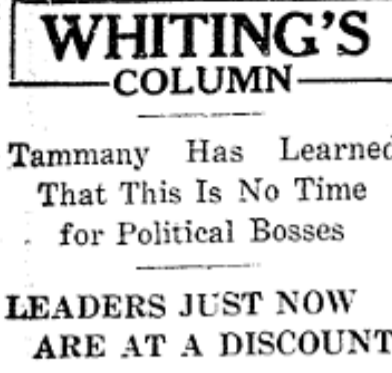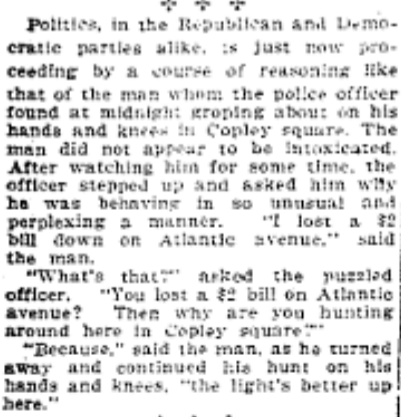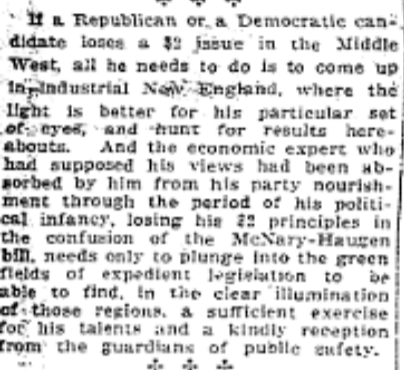I was recently in a discussion about presidential standards. Someone made the same case Senator John Cornyn does in this Tweet, that we should evaluate presidents by what we can see them do. I argued, as I do in my book, that this is not just wrong, but a big problem. The job is more than what we can see. A great deal more. When we evaluate presidents by what we can see we make the same mistake of evaluating heart health by shoe size. (Buy the book at your local bookstore to learn more, etc.)
But friends, I did not come to push merchandize. My point is to distribute a revelation!
The incorrect view of the presidency is an example of the Streetlight Effect: we look for the keys under the streetlight not because that’s where we dropped them, but because that’s where the light is.
I’ve used this phrase for years, but started to investigate its origins. I found (near as I can tell), that it was born in politics. The first known example, according to Quote Investigator is from a Boston Herald column from May 24, 1924, written by E.E. Whiting:
Here’s the famous story:
Whiting tells this story to have a little fun with politicians who have no principles. He says that while he thought politicians and political parties actually believed fixed things, it turns out they are like the man under the streetlight. If they can’t find votes in one place for a measure– say the Midwest– they take their pitch to the Northeast, where voters might buy it. I’m not sure the analogy holds, but it is certainly true for presidents. We define the street based on what we can see under the streetlight. We define a presidency based only on what we can see. We don’t define the job by what it actually is– because much of it takes place behind closed doors– we define it by the parts we can see. This might also, I suppose, be a version of Availability Bias.
In the age of television, the streetlight is the camera. Which, as I explain in the book, is why candidate John Kennedy, who looked good under that streetlight, tried to convince people that it wasn’t the wrong place to look for presidents but was the best possible place to look for presidents. We have seen variations of this as political pundits have elevated “authenticity” over all other qualities. Because this display can be witnessed, it becomes the most important quality to evaluate, leading to the dull conclusion that a candidate whose handlers have spent weeks teaching him how to be authentic, is indeed authentic when he successfully achieves the practiced artifice in front of the cameras.
-0-
Here’s the later riff in the column where Whiting makes the connection between the story and politics:



Would love to hear how you might have added to or changed your book The Hardest Job in the World after the insurrection on January 6th?
Thoroughly enjoyed the book and I ‘m considering leading it at my book club.